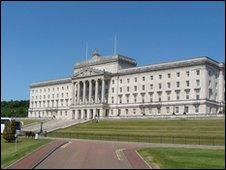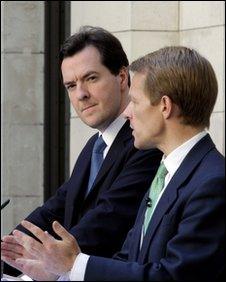Northern Ireland spending cuts: Q&A
- Published
On Monday the government in Westminster announced £6bn of reductions in public spending, £128m of which will be cut from the Northern Ireland budget. BBC NI News looks at how, where and when the cuts are likely to be made and their potential impact on public services.

How is Northern Ireland funded?
The devolved administration does not have responsibility for tax-gathering. Therefore when tax is gathered in Northern Ireland, it is collected by HM Revenue and Customs and it goes directly to the treasury in London.
The treasury then works out how much Northern Ireland should get from the United Kingdom's overall income. That sum of money is then given to the Northern Ireland Executive annually, through what is known as the "block grant".
How is the sum Northern Ireland receives calculated?
The share of UK government spending that goes to Northern Ireland - and to Scotland and Wales - is worked out using what is known as the "Barnett Formula".
Named after the former Chief Secretary to the Treasury, Lord Barnett, the mathematical formula has been in use in Scotland and Northern Ireland since 1979.
Although it was originally intended to be based upon relative population rather than on need, it has resulted in higher spending per capita in the devolved nations than in England.
The block grant for this financial year for Northern Ireland is about £8bn.
How much will be cut from the grant?
The UK government has said that it needs to take urgent action to reduce the growing budget deficit, that is the difference between the money it has and the money it spends. It can do that by raising taxes and/or reducing public expenditure.
On Monday, the chancellor of the exchequer, George Osborne, and the current Chief Secretary to the Treasury, David Laws, said that they would be telling each government department to implement their share of more than £6bn of cuts in public spending.
Included in these reductions are cuts to the block grant to each of the three devolved administrations of £704m. When Northern Ireland's share is calculated it works out at £128m. That is about 1.6% of the Northern Ireland budget.
The cuts announced on Monday are on top of the £393m government departments in Northern Ireland have already been told they must save in this financial year.
When will the cuts be implemented?
While Whitehall departments have to make their reductions within the current financial year, the government has given the devolved administrations three options: to begin the cuts now, to defer them until the next financial year, or to implement some now and defer the rest.
The finance minister Sammy Wilson has said that he probably favours the third of those options, although the decision will be taken by the executive as a whole.
What will be the impact on public services?

The overall cuts were announced by George Osborne and David Laws
When all the ministers in the Stormont executive have worked out when they will implement the cuts, they will then decide together by how much each individual department's budget will be reduced.
When that figure is established, individual ministers will decide how that should be implemented within their own departments.
The Northern Ireland Executive could decide to follow the UK government's pledge on health spending by ringfencing some departments as immune from cuts.
Or it could choose "salami-slicing", choosing to reduce every governmental department's spending.
Unions have warned that regardless of how the cuts are implemented, they believe they will have a detrimental impact on the quality of public services.
One way that the Northern Ireland Executive could raise funds itself would be to agree the introduction of water charges. That would mean money which is currently used to pay for household water could be diverted to other public services.
However, despite several ministers saying that water charges are eventually "inevitable" the executive has repeatedly deferred their introduction.
Last week, the finance minister Sammy Wilson said that they would probably not be introduced before April 2012.
Will these be the last cuts to the Northern Ireland budget?
No. It is very likely that there will be more cuts in the near future. The government in Westminster has said that significant reductions will be necessary over the next three years and that these cuts of £6bn are just the beginning of its effort to reduce the massive budget deficit.
However, political leaders in Northern Ireland have said they will unite to fight the cuts and protect as much of Northern Ireland's block grant as they can.
- Published24 May 2010
- Published21 May 2010